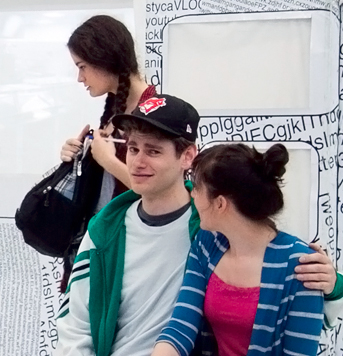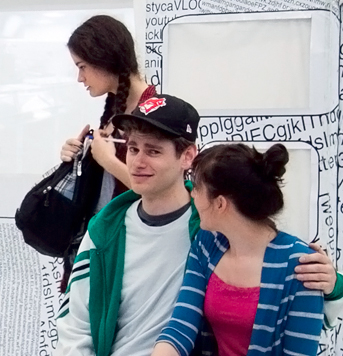
Several months ago, Maureen, our GM, was contacted by a student of the London School of Economics inquiring about Theatre for Social Change and the work we do to progress the social change agenda in Canada. In her email the student, who for purpose of this blog post requested to be nameless (a request made in relation to maintaining her own research practices), expressed an interest to interview our Artistic leadership for her dissertation. Feeling honoured, we agreed and over the next couple of months we eventually were able to set a schedule for her visit from England.
The plan was to have her visit for 3 days. During these days she would meet the office team and artistic team, sit in on a rehearsal and preview performance of Plastico: an Epic ECO adventure and lastly hold a focus group with MCT associates to explore theatre for social change in Canada and her dissertation themes. Upon meeting the student and talking to her about her research, I decided to turn the tables and make the researcher – the researched. So we held a little interview. Below is the transcript of our discussion.
Duncan: You’re coming from the London School of Economics, but you are researching theatre for social change, how does that work?
A lot of people have misconceptions about the London school of economics; it is a social science university, and I am studying at the institute of social psychology. I am studying human behaviour, particularly towards helping community development. I wanted to go into health policy initially, but as I was just telling the girls [Maureen and Kristin] my interests were more in how the human mind works particularly not at the individual level, but at the community level and how we can utilize that in order to make a social impact and create awareness about issues that need desperate awareness, so that is where my research started.
And I am interested in theatre generally. I came to Canada from Pakistan when I was 13, and Pakistan being a society where we don’t like to talk much about anything, one of the first plays I saw in my eighth grade class was about sexual education. And I was…, this was the first time that sex was talked about in a gym full of other students, and I was like “woah, what is going on?” and it sparked an interest. Now when I think about it, I forgot about that play for many, many years but that was the first time getting educated about sex, and it had an impact.
The reason for this research project was because of my favourite professor’s class. She does research in Brazilian favellas, and had been working with an organization called Afra-Reggae. What they do is, its a bunch of guys from the slums, who started dancing one day and their dance grew popular and got support from other community partnerships, getting bigger and bigger, so they started recruiting other kids and now their this big organization. I think they performed with Cirque de Soliel last year. Anyways they just went viral and they have ended up helping thousands and thousands of kids get off the streets. It was a big movement and I wanted to see how far we can take theatre. So that’s why I started researching.
Duncan: In terms of theatre do you have any theatre experience yourself?
None what so ever.
Duncan: So then why theatre? Why does that speak to you so much?
In any play, there is the audience. I love being the audience. I love seeing it, it absolutely excites me. I know many people enjoy theatre, but I just feel that because theatre is so versatile it can address so many issues, you can be something extremely funny or something extremely sad, you can talk about anything with theatre. I believe to address these sensitive issues theatre is a good forum to do so. I want to take this places where theatre is not considered okay. If you take theatre to a place like Pakistan, I believe that it has quite a bit of power in order to influence social change.
And I have a lot of theatre watching experience, if that is important.
Pakistan has a very vibrant culture of theatre and movies and music. Theatre is just entertainment and is very popular, and has a very large audience, just not this kind of theatre.
Duncan: So you said that aside from interviewing MCT there is a company in Pakistan that you have discovered that already does Forum?
Yes. They are very successful, very political organization. I stumbled upon them, and I spoke to my dad, who is a big social activist – at least in his head – and he said that ‘when we were rallying on the streets in Pakistan back in the 1980’s the theatre was really popular’ and what they do is go from village to village and they could get killed or murdered for it. Right now a few of their productions are banned so if they get caught doing it they will be jailed, and they do it anyways. That is the only way that in a place that is so oppressed as Pakistan, to talk about anything. Hopefully I will get to interview them.
The comparison I think will be very interesting because the challenges that you face may be so different and so similar at the same time. I really want to dig deep and see what it is.
Duncan: How did you discover specifically Forum Theatre or let’s say Theatre of the Oppressed?
I wrote a 7000 word paper on Paulo Freire. Two of my friends are also heavily involved in the practice. One is from Chile, and one is from Peru, and apparently in Latin America TofO is really picking up popularity. They feel it is very important, so I wanted to transport that idea to south Asia. So that’s how the idea started, and it is developing more and more everyday.
Duncan: If there is one thing out of your research, aside from completion of your dissertation, what are you hoping for?
Oh that’s a good one. I am hoping for an answer. And that answer I know I am not going to get, so that is a bad answer to your question.
Duncan: An answer to what?
An answer to how to start this dialogue that is continuous. How to have a conversation in a place that is developing, without the fear of being persecuted. How do you take a community of people where a conversation between a man and a woman is taboo, and bring them together and create a safe space where we can talk about sexual education, where we can talk about homophobia. How to get that answer from a place like Canada, where these conversations can happen and take them back home. I know this is a broad answer and that I am talking about a total social revamping that I know is not going to happen. Just the key ingredients that are needed in creating that safe space, like a 4 by 4 room where a couple of people can sit and have a conversation about fear.
Does that make any sense? It doesn’t make sense.
Duncan: No, it does. Your hoping to get closer to understanding how to create a safe space for dialogue about social change.
And I think theatre is one of the only answers. People take it seriously without taking it too seriously. If someone doesn’t agree with what they see – they will disregard saying ‘oh their just actors’ and they will just go. People take it seriously, but not too seriously, so its getting its job done. Its sending that message, its creating that dialogue and people are having conversations when they leave. At the same time its not a political rally that if people don’t like what they are hearing they wont get to angry.
Duncan: Earlier in our conversation you said that you have seen a surge in this kind of work, so I wanted to know what you think is causing that?
I think awareness in general. In the last five – fifteen years the level of communication that is increasing from place to place. There is so much information available. People can see what is happening all over the world, all you need to do is go on YouTube, and that is creating a movement, that is creating an awareness, and we may not realize that on an everyday basis, but I am sitting here, I am studying in the UK and I am going to be going to Pakistan. Its these ideas that are being transported so rapidly around the world that is causing an effect that these issues are becoming more and more in our face, we are able to see them, we are able to see what people are doing and that is what our job as social activists is, taking good ideas from certain places and putting them in other places that need good ideas. So I think that has a lot to do with it, the fact that information is so freely available. People are getting more interested, because we are seeing things failing. None of the WHO development goals are being fulfilled for 2015, we have failed on all of them. S o this time focus on educating women, forget educating everyone – its not going to work. Educate your women.





